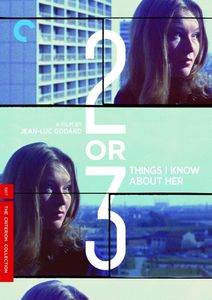 Who is she? Who is “Her?” This is the first question that is inevitably asked of Jean-Luc Godard as the title cards repeat the nationally colored words: 2 or 3 Things I Know About Her.
Who is she? Who is “Her?” This is the first question that is inevitably asked of Jean-Luc Godard as the title cards repeat the nationally colored words: 2 or 3 Things I Know About Her.
Who is “Her?” “Her” is Juliette Janson, a middleclass housewife, working as a prostitute in order to get by. “Her” is Paris, a modernizing, consumerist city. “Her” might represent even more, but that is left squarely up to the viewer to discover in its unconventional duration.
Jean-Luc Godard’s 2 or 3 Things I Know About Her is not so much a traditional narrative film as it is a collage of ideas, characters, sounds, shapes, colors, and images of a modernizing Paris—a modernization produced by consumerism and the debasement of “life” to perpetuate that lifestyle. Formally, this is a film about poetic repetition, both visually and aurally. Intellectually, this is a politically charged film about the social implications of consumerism and the repetitive nature of middle class daily life: one wakes, one works, one sleeps, and in the morning, one repeats. They act as complementarily, deepening the reasoning for the other’s presence. But even these formal qualities and intellectual concepts only begin to scratch the surface of Godard’s purposeful questioning of, well, almost everything. Godard teeters back and forth between poetry and politics, and he even alludes to this through his self-aware, whispering narration. In relation to his body of work, this film offers a launching point for the type of work that would come to define the rest of his career.
Filmed in conjunction with Godard’s Made in U.S.A., a film that took the form of his usual, genre-based, new wave style of filmmaking. 2 or 3 Things I Know About Her offers a markedly different approach to filmmaking. While his recognizable experimentation with jarring sounds and sumptuous visuals return in 2 or 3 Things (and with more confidence and purpose) his thematic, aesthetic, and narrative styles are removed in favor of a more political, avant-garde, and fractured formal quality. Gone is the homage to the heyday of Hollywood genre pictures, because, now, the United States is involved in Vietnam; and anti-American/imperialist themes run heavily through this picture’s running time.
This is the first time I have seen the film, and after two viewings, I am still working my way through Godard’s essayist treatise on consumerism, Parisian life, war, and language (among many other musings: questions without concrete answers). There is a 24-hour narrative wrapped around Godard’s voice as he whispers to the audience—narration, his poetic imagery, and random monologues and interludes by fleeting characters—but it is almost inconsequential as nothing actually happens. But that is the point, it seems, as these characters are almost merely mouthpieces for Godard’s rhetoric. The film depicts a day in the life of a working Parisian woman, prostituting to afford a manageable life with her husband and children. There is no dramatic arc in this narrative, and that is precisely the point: this is a day like any other day for Juliette Janson (the female protagonist). And why must she, and other women like her, prostitute themselves? Because the ever-increasing consumerist culture to which they subscribe requires more and more money.
After listening to the densely packed and remarkably well-informed commentary by film scholar, Adrian Martin, my appreciation for the film has grown with a more developed understanding of the film’s history and intentions. It’s worth a spin or two, and it is a welcome addition at the film’s lower-tiered price point, as Criterion usually reserves commentaries for their more expensive packages. The other supplements—a wonderful trailer, a few great interviews, and a featurette on the film’s origins—tightly round out the package rather nicely. For Godard fans, you can’t do much better for the price.
-Jonathan Zielske
Available on DVD from The Criterion Collection.
Written and directed by Jean-Luc Godard, based on an article by Catherine Vimenet; cinematography by Raoul Coutard, sound by René Levert, edited by Françoise Collin, costumes by Gitt Magrini, Produced by Anatole Dauman and Raoul Lévy.
WITH: Marina Vlady (Juliette Janson), Anny Duperey (Marianne), Joseph Gerhard (Monsieur Gérard), Roger Montsoret (Robert Janson), Raoul Lévy (John Bogus, the American journalist), Jean Narboni (Roger), Christophe Bourseiller (Christophe Janson).